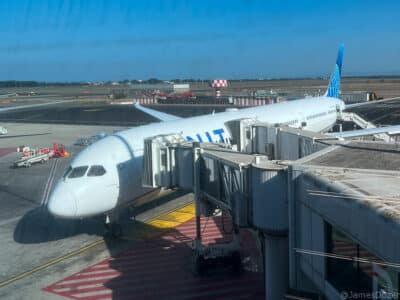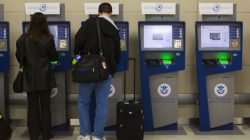I launched “Hack My Trip” two years ago without much clue as to what I was doing. It started out as more of a journal and still is in some respects. I’m fortunate that it has grown into a business that earns me a modest income, but more than that I appreciate the fact that the loyalty of my readers allows me to deviate into topics I find interesting rather than worry too much about what will garner the most page views. Because if it really were that much of a business, I’d probably get bored and stop.
A recent article by Stephanie Rosenbloom at The New York Times has some good suggestions about improving the travel experience, some of which I’d like to expand upon. I also decided to add a few of my own. So if you’re just getting started reading my blog, here are eight suggestions for how you can easily improve your next trip.
Get PreCheck Nearly Every Time
Now that the government is letting 25% of all passengers into the line, people are all excited about this newfangled PreCheck thing. I’ve about given up on the excellent experience I had when the line was usually empty, but at least it means PreCheck is rolling out to more airports. Even OGG, an airport that tends to get crushed with passengers departing at the same time and which previously had no form of priority security.
Sure there’s a 25% chance you’ll get it as an ordinary passenger. And there’s a somewhat higher chance if you have elite status with a participating airline. But PreCheck becomes much more valuable when you can rely on it. To do that, you need to have a Trusted Traveler Number that all but guarantees you’ll get three beeps.
The TSA is offering enrollment for $85. Don’t do it. Instead you should get a Global Entry card for $100 (good for five years) that also includes faster customs and immigration when you re-enter the country. United offers to pay this fee if you have elite status and some credit cards reimburse the fee (most variants of the American Express Platinum Card).
Choose Planes with WiFi and Power Outlets
I don’t normally need Internet access or power while in-flight, but it does become more important on longer trips or those that involve short connections without much time to recharge and reconnect. The challenge can sometimes be figuring out which planes actually have those benefits when you know you’ll want them. Routehappy is a good service for comparing flights, including amenities with other factors like price and schedule.
Premium cabins on international flights almost always have AC power outlets that work the same as the ones at home. Not all first class cabins have AC power on domestic flights; many instead have old DC ports requiring an adaptor you probably don’t have. Or they may not have power at all. Economy class may have power at all seats, in certain rows, or not at all. And Internet access is still rare on some carriers (e.g., United) or on most international routes. SeatGuru is an option for looking at features on individual aircraft, seat by seat.
Finally, there are lots of little things worth researching when all else looks equal. Bulkhead seats can be great when the divider doesn’t stretch all the way to the floor — and quite awful when they do. SeatGuru comes in handy again here. Other times you may have to choose between two carriers at the same price. If you’re stuck in economy class, be sure to check if your airline softens the blow with free booze. (United just stopped serving free alcohol on its trans-Pacific routes, while Delta has expanded its offerings.)
Get More Comfortable Seats on Flights to New York
Competition is heating up for lie-flat seats on transcontinental routes from Seattle, San Francisco, and Los Angeles to New York-JFK. Four airlines offer this feature now or in the near future. Delta has lie-flat seats from all three West Coast cities. American and United offer it from San Francisco and Los Angeles, and JetBlue will be joining them soon. Starting in January, American will be enhancing its current offering with the new Airbus A321T from Los Angeles and eventually San Francisco, too.
I don’t recommend going out of your way to take advantage of one of these premium cabins. It’s not worth the inconvenience if you can already fly direct, for example, from Seattle to Newark on United or from San Diego to JFK on American. At about five hours, most people won’t be able to get much sleep on a lie-flat seat, and any greater productivity from a more spacious cabin is probably lost with the time you spend on connecting flights. But it is worth knowing your options if you can choose your carrier and happen to live in a targeted market.
Be Prepared for Travel Emergencies
When flights get delayed or cancelled, you miss a flight, or anything happens that you didn’t plan for, it pays to be prepared. Obviously you should try to get assistance from an agent if you can, maybe even moving to an airport club or another gate if the ones at your flight are overwhelmed. But sometimes that’s not enough.
Be willing to take matters into your own hand. Store numbers for airline and hotel reservations lines on your phone — they’re on my favorites list just below immediate family — so you can call and ask to be rebooked or receive assistance. Be prepared to cover some costs yourself and request reimbursement later. I’ve had success getting compensation for reasonable hotel, taxi, and meal expenses from Alaska Airlines instead of waiting in a one- to two-hour line for vouchers. The best part? Because I paid myself in the first place I got to pick a preferred hotel and get credit toward elite status.
Some credit cards also provide compensation when your trip experiences unusual delays. Several Chase credit cards offer $300 in reimbursement for lodging and meals if you flight is delayed for more than 12 hours. The catch is that you need to pay for your ticket using that card. American Express used to offer an optional insurance program but seems to have stopped taking new customers.
Avoid Fees with the Right Credit Card
Low-level elite status is rarely worth it anymore. Most benefits can be replicated with a co-branded credit card, so I recommend getting one if you expect to check a bag or think you’ll benefit from the priority boarding and check-in lines. (Even if you carry on, there may not be space left for your bag if you’re the last to board.) Most credit cards are worth it for an annual fee of $75-100. I tend to be less enthusiastic if you already have elite status that avoids these fees.
Be sure to carefully investigate the card’s benefits before applying. Do you need to use that card to pay for your ticket, or can you just flash it at check-in? Do you need to buy through the airline’s website? Does it provide a free bag just for you (Hawaiian), for a companion (United), or for the whole family (Delta)? Some credit cards also provide discounts on in-flight purchases. It’s not much but can add up over time.
One thing elite status can get you that credit cards usually don’t is priority consideration in a rebooking scenario. As a top-tier elite member, for example, I move to the top of the standby list on the next flight even if other people have been waiting since early that morning. But this matters more if you fly more often, in which case you’ll have elite status, too.
Renew Your Passport and Any Visas
Passports expire. Even if yours doesn’t expire until the week after you return from your trip overseas, that probably isn’t good enough. Most countries require that your passport be good for much longer, say for six months after your date of entry. If my passport were going to expire any time in the next year, I would be concerned. So memorize your passport’s expiration (and your passport number, while you’re at it) and make sure you keep it up-to-date.
Visas are trickier because every country is different. As an American it helps that I have a U.S. passport because many countries just waive me through. But it can also be a liability since the U.S. makes it difficult for many other nationalities to visit. Reciprocity fees imposed on Americans can be in the hundreds of dollars (though visas may be valid for a decade or more). And though countries like China have 72-hour waivers for visiting select cities, this only applies if you are passing through on your way somewhere else.
Oddly enough, destinations like Bali are most annoying to me. Their visa is not much more than a tourism tax. Pay $30 on arrival and you get in. But it really, really helps move things along if that $30 is in U.S. dollars and exact change. These things are worth researching in advance whenever you visit a new country.
Find a Lounge at the Airport
Three are three ways to gain access to an airport lounge besides purchasing a pricey international first or business class seat: (1) buy a membership or credit card that includes access, (2) get elite status, or (3) pay on a case-by-case basis.
I generally recommend the membership/credit card approach, but this is becoming more difficult with time. The American Express Platinum Card will soon limit access to Delta Air Lines, Alaska Airlines, and a few others after losing access to US Airways and American Airlines clubs. But it is expanding access to its own Centurion Lounges, which are opening in more airports.
Delta, American Airlines, and United all offer credit cards that include access to their own lounges. Depending on which carriers you fly, it is almost always cheaper to get one of these credit cards or the American Express Platinum Card rather than buy a lounge membership separately. You’ll also get other benefits with a credit card.
Elite status normally doesn’t grant access to lounges by itself, though mid-tier status on most carriers will include access to domestic and international lounges on international itineraries. Or if you do mostly domestic travel, Delta’s top Diamond Medallion tier includes Sky Club access. Other options are to get a status match with an international partner, like United’s Star Alliance partners Turkish and Aegean, so that all of your domestic trips appear to be “international.”
You can find lounges available at each airport, and determine your access privileges, using the free LoungeBuddy app I reviewed last year. (Disclaimer: I’ve since started doing some contract work for LoungeBuddy.)
Get Discounts on Nearly Every Reservation
There are a lot of ways to save money on travel if you know where to look. Sometimes it’s as simple as searching on Google for “[company name] coupon”. Doesn’t usually work, but an easy effort. Others are easily overlooked. Organizations like Costco, AAA, and AARP offer discounts to their members at lots of hotel chains. I’ve only ever used AAA’s auto services once in my life, but I save ten times’ the annual membership fee booking discounted refundable rates at Hyatt hotels. Certain credit cards and shopping portals also offer cash back.
Car rental companies will hand out discounts to almost anyone. The challenge is sorting the good from the bad. I’ll use my American Express Platinum Card to book rentals at Hertz for a four-hour grace period, but otherwise my usual favorite is National. At both I’ll use a wide variety of coupon codes from the (now defunct) Entertainment Book …without ever being asked to present those coupons. Be careful about using discounts your not actually entitled to, but you can often find whole lists of them in online discussion forums.
Finally, it’s extremely difficult to find discounts on airfare in my experience. I usually wait until a particular destination goes on sale, though not everyone has that flexibility. Another option is to search for conference discount codes. Are you going to Chicago? Some cities have a convention every week, and the websites for these meetings often publicly share discount codes that will save 5-15% off travel to that city during a fixed period.
Summary
Not a whole lot here that will be new to some experts, and others will think I’ve oversold some tips. But the point is to be thoughtful. Travel can be expensive, time consuming, and stressful. For all these reasons it deserves your attention. Nearly all horror stories I hear are about people who didn’t plan in advance. But if you think about the problems you are likely to encounter, the things that you know will probably cause you the most trouble, then you can work now to prevent them from being an issue.
Don’t care about cost? Then focus on saving time with PreCheck. Or if it’s the reverse, spend your time in the airport security line researching coupon websites. It’s more productive than complaining about the cost and hassle of travel to anyone who will listen.
Just don’t be the guy who shows up at the airport and didn’t realize he needed a visa to visit China. Yeah, I’ve seen that happen, and it sucks.





